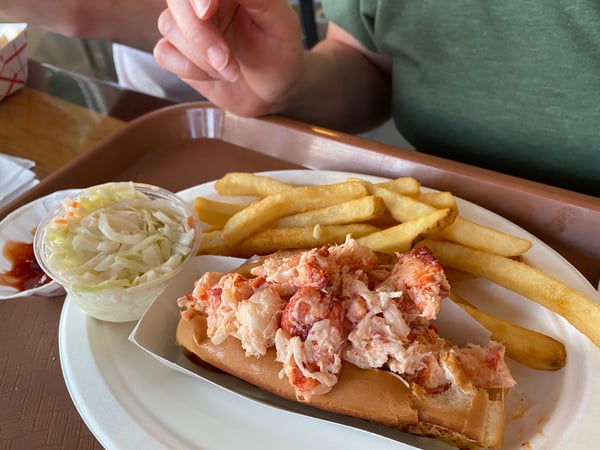Last week, my family and I spent the week on Cape Cod and as you can probably imagine, we indulged in seafood dish after seafood dish. When in Rome, right?! We were there with my brothers and their families, and because they have been to the Cape before, they were our tour guides and took us to several excellent restaurants.


Since I wanted to keep the overall theme centered around seafood, I came to the conclusion that crispy fried oyster maki rolls was the obvious choice! Because I decided to make the fried oyster maki after we got back to the Chicagoland area, I wasn’t able to get my hands on Wellfleet oysters, but I did find some Blue Point oysters at my local grocery store, which are harvested in the Long Island Sound.
Fried Oyster Maki Rolls
Scroll down for a printable version of this recipe
Yield: 4 futomaki rolls
Active time: 45 minutes
Start to finish: 45 minutes
2 cups sushi rice
Seasoned rice wine vinegar, as needed
For the oysters:
Canola or vegetable oil for frying
1 dozen oysters, shucked
1 cup all-purpose flour
2 eggs
1 1/2 cups panko breadcrumbs
4 sheets nori
1/2 ripe avocado, sliced
1/2 seedless cucumber, julienned
Spicy mayo- 1/2 cup good quality mayonnaise and 1 to 2 teaspoons Sambal or Sriracha
Soy sauce for dipping
Pickled ginger
Wasabi
1. Cook the rice according to the recipe on the packaging. Once the rice is done, transfer to a large bowl or baking dish, and season with just enough of the seasoned vinegar until the rice is glossy and flavorful, approximately 1/4 to 1/3 cup. Cover with a damp towel to prevent the rice from drying out. Set aside.
2. In a wide, shallow pan, heat the oil for frying the oysters.
3. While the oil is heating, bread the oysters. Place the flour, eggs and breadcrumbs in three separate shallow dishes. Tip: Add any oyster juices to the egg wash for maximum flavor.
4. Dredge the oysters through the flour first, tapping off any excess. Dip into the egg wash and then thoroughly coat in the breadcrumbs.
5. Fry the oysters, in batches if necessary, until golden brown and crisp. Using a slotted spoon, transfer the oysters to a cooling rack set over a sheet tray or a paper towel-lined plate.
6. To make the maki rolls, place a sheet of nori, shiny side down, on a plastic wrap-wrapped bamboo rolling mat. Note: Wrap the mat in plastic to prevent rice getting stuck in between the slats.
7. Dip your fingers in cool water to prevent the rice from sticking to your hands, and gently spread the rice on the full sheet of nori, leaving a 1-inch strip without any rice on the end furthest away from you.
11. Use the mat to finish rolling the maki up and to seal it closed. Tighten the roll in the same fashion by pulling in opposite directions. Don’t just squeeze the roll…roll it.
13. Serve with wasabi and pickled ginger, and enjoy!
- July 31st for Double Date: Hands-On Paella Party
- August 28th for Shellfish on the Grill
- August 29th for Virtual Grilled Lobster Thermidor
- September 20th for our popular, week long Culinary Boot Camp
Fried Oyster Maki Rolls
Ingredients
- 2 cups sushi rice
- Seasoned rice wine vinegar, as needed
- Canola or vegetable oil for frying
- 1 dozen oysters, shucked
- 1 cup all-purpose flour
- 2 eggs
- 1 1/2 cups panko breadcrumbs
- 4 sheets nori
- 1/2 ripe avocado, sliced
- 1/2 seedless cucumber, julienned
- Spicy mayo- 1/2 cup good quality mayonnaise and 1 to 2 teaspoons Sambal or Sriracha
- Soy sauce for dipping
- Pickled ginger
- Wasabi
Instructions
- Cook the rice according to the recipe on the packaging. Once the rice is done, transfer to a large bowl or baking dish, and season with just enough of the seasoned vinegar until the rice is glossy and flavorful, approximately 1/4 to 1/3 cup. Cover with a damp towel to prevent the rice from drying out. Set aside.
- In a wide, shallow pan, heat the oil for frying the oysters.
- While the oil is heating, bread the oysters. Place the flour, eggs and breadcrumbs in three separate shallow dishes. Tip: Add any oyster juices to the egg wash for maximum flavor.
- Dredge the oysters through the flour first, tapping off any excess. Dip into the egg wash and then thoroughly coat in the breadcrumbs.
- Fry the oysters, in batches if necessary, until golden brown and crisp. Using a slotted spoon, transfer the oysters to a cooling rack set over a sheet tray or a paper towel-lined plate.
- To make the maki rolls, place a sheet of nori, shiny side down, on a plastic wrap-wrapped bamboo rolling mat. Note: Wrap the mat in plastic to prevent rice getting stuck in between the slats.
- Dip your fingers in cool water to prevent the rice from sticking to your hands, and gently spread the rice on the full sheet of nori, leaving a 1-inch strip without any rice on the end furthest away from you.
- About 2-inches up from the bottom the roll, place your fillings along the rice. Position your thumbs under the mat and place your other fingers on the ingredients to keep them in place. Using your thumbs, bring the mat up and over the fillings. Remove your fingers from the ingredients so you can “tuck them in.”
- With the mat wrapped around the roll, tighten this portion of the roll by placing one hand around the roll and the other hand at the top of the mat, and pulling in opposite directions along the whole length of the roll. Keep in mind this is just to secure the ingredients. The roll is not complete yet.
- Moisten the edge of the nori without any rice with a small amount of water.
- Use the mat to finish rolling the maki up and to seal it closed. Tighten the roll in the same fashion by pulling in opposite directions. Don’t just squeeze the roll…roll it.
- Using a sharp slicing knife, cut the roll into 8 pieces, wiping the blade clean between each slice.
- Serve with wasabi and pickled ginger, and enjoy!
